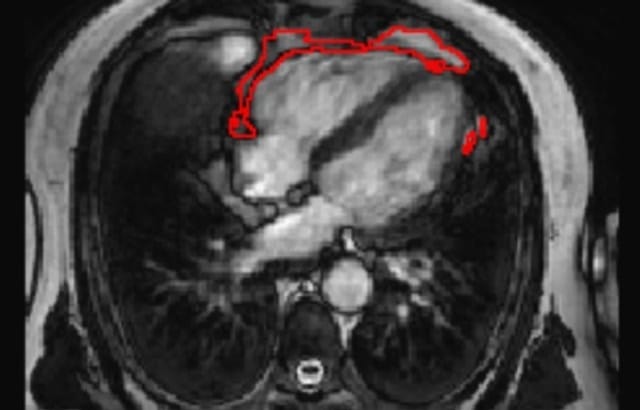AI predicts diabetes risk by measuring fat around the heart

A team led by researchers from Queen Mary University of London has developed a new artificial intelligence (AI) tool that is able to automatically measure the amount of fat around the heart from MRI scan images.
Using the new tool, the team was able to show that a larger amount of fat around the heart is associated with significantly greater odds of diabetes, independent of a person’s age, sex, and body mass index.
The research is published in the journal Frontiers in Cardiovascular Medicine and is the result of funding from the CAP-AI programme, which is led by Barts Life Sciences, a research and innovation partnership between Queen Mary University of London and Barts Health NHS Trust.
The distribution of fat in the body can influence a person’s risk of developing various diseases. The commonly used measure of body mass index (BMI) mostly reflects fat accumulation under the skin, rather than around the internal organs. In particular, there are suggestions that fat accumulation around the heart may be a predictor of heart disease, and has been linked to a range of conditions, including atrial fibrillation, diabetes, and coronary artery disease.
Lead researcher Dr Zahra Raisi-Estabragh from Queen Mary University of London said: “Unfortunately, manual measurement of the amount of fat around the heart is challenging and time-consuming. For this reason, to date, no-one has been able to investigate this thoroughly in studies of large groups of people.
“To address this problem, we’ve invented an AI tool that can be applied to standard heart MRI scans to obtain a measure of the fat around the heart automatically and quickly, in under three seconds. This tool can be used by future researchers to discover more about the links between the fat around the heart and disease risk, but also potentially in the future, as part of a patient’s standard care in hospital.”
The research team tested the AI algorithm’s ability to interpret images from heart MRI scans of more than 45,000 people, including participants in the UK Biobank, a database of health information from over half a million participants from across the UK. The team found that the AI tool was accurately able to determine the amount of fat around the heart in those images, and it was also able to calculate a patient’s risk of diabetes.
Dr Andrew Bard from Queen Mary University of London, who led the technical development, added: “The AI tool also includes an in-built method for calculating uncertainty of its own results, so you could say it has an impressive ability to mark its own homework.”
Professor Steffen Petersen from Queen Mary University of London, who supervised the project said: “This novel tool has high utility for future research and, if clinical utility is demonstrated, may be applied in clinical practice to improve patient care. This work highlights the value of cross-disciplinary collaborations in medical research, particularly within cardiovascular imaging.”
CAP-AI is led by Capital Enterprise in partnership with Barts Health NHS Trust and Digital Catapult and The Alan Turing Institute and is funded by the European Regional Development Fund and Barts Charity.
More information
- Research paper: ‘Automated quality-controlled cardiovascular magnetic resonance pericardial fat quantification using a convolutional neural network in the UK Biobank’. Andrew Bard, Zahra Raisi-Estabragh, Maddalena Ardissino, Aaron Lee, Francesca Pugliese, Damini Dey, Sandip Sarkar, Patricia B. Munroe, Stefan Neubauer, Nicholas C. Harvey, Steffen E. Petersen. Frontiers in Cardiovascular Medicine. Available here: https://www.frontiersin.org/articles/10.3389/fcvm.2021.677574

 Accessibility options
Accessibility options Translate the page
Translate the page